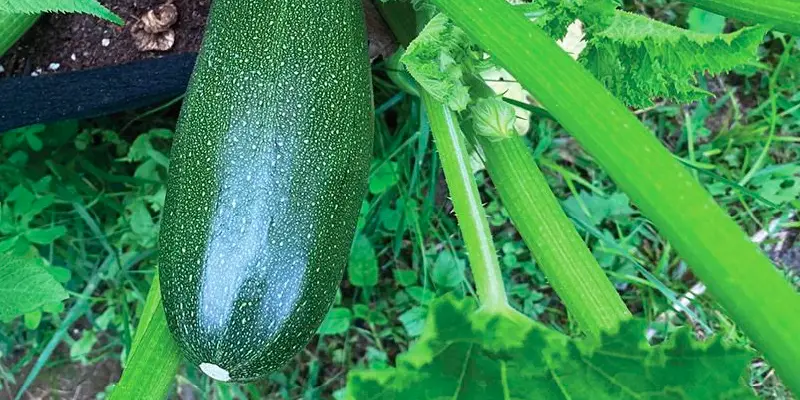Have you ever grown zucchini, or any other type of squash for that matter? If so, you may have noticed that they come in all shapes and sizes. Some are long and thin, while others are short and fat. What makes them grow this way? In this blog post, we will take a look at the factors that influence zucchini growth, and offer some tips on how to get the most out of your plants!
Why Are My Zucchini Short And Fat?
The main reasons for zucchini being short and fat include cross-pollination, pest infestations, diseases, low-quality soil, and a lack of sunlight or water. I’ve found that any one of these reasons can stunt how long a zucchini grows.
To grow a healthy zucchini, it is important to start with a high-quality seed. I like to buy my seed from a local nursery or garden center. Once you have your seed, you will need to plant it in well-drained soil that is rich in organic matter. Zucchini plants need a lot of sunlight, so make sure to plant them in an area that gets at least six hours of sun per day.
I will now go over each of these reasons in more detail so that you can identify the exact issue affecting your zucchini plant.
Seed Cross-Pollination
One of the main reasons for zucchini being short and fat is seed cross-pollination. This occurs when two different types of plants are grown close to each other and the bees transfer pollen from one plant to the other. The resulting zucchini will have characteristics of both plants, which can include being short and fat.
To avoid this issue, make sure to plant your zucchini in an area where there are no other squash plants nearby. Plus, make sure the seeds you purchase are from a reputable source and are labeled as pure zucchini seeds.
Pest Infestations
Common pests that attack zucchini plants include cucumber beetles, squash bugs, and aphids. These pests can cause a variety of problems for your plant, such as stunted growth, yellowing leaves, and misshapen fruits.
To control pests, you will need to use a combination of IPM (Integrated Pest Management) practices and pest-specific controls. Some IPM practices that can be used for controlling cucumber beetles include crop rotation, using row covers, and planting trap crops.
Neem oil is a great pest-specific control for aphids and other bugs that attack zucchini plants. To use neem oil, mix it with water and spray it on your plant leaves. Make sure to do this in the early morning or evening to avoid harming the leaves with the sun’s heat.
Diseases
Another common reason for zucchini being short and fat is due to diseases. The most common diseases that affect zucchini plants are powdery mildew and downy mildew. These diseases can cause stunted growth, yellowing leaves, and misshapen fruits.
To control diseases, you will need to use a combination of cultural practices and fungicides. Some cultural practices that can be used for powdery mildew and downy mildew include crop rotation, using resistant varieties, and increasing air circulation. And some fungicides that can be used include chlorothalonil, mancozeb, and copper hydroxide.
Low-Quality Soil
Zucchini plants need well-drained soil that is rich in organic matter. If your soil is too sandy or too clayey, it will not hold enough water or nutrients for your plant, and this can lead to stunted growth.
To improve the quality of your soil, you will need to add organic matter such as compost or manure. You can also use a soil test kit to test the pH of your soil and adjust it accordingly. The ideal pH for zucchini plants is between six and seven.
Lack of Sunlight
Zucchini plants need a lot of sunlight, so if they are not getting enough, it can lead to stunted growth. It’s the same with any other type of plant – they need sunlight to produce food for themselves through photosynthesis. If your zucchini plants are not getting at least six hours of sun per day, they will not grow as well as they should.
To solve this problem, you will need to move your plants to an area that gets more sun. I tend to move my plants around a lot to make sure they are getting the right amount of sun. You may need to remove any plants or objects that are shading your zucchini plants.
Lack of Water
Another common reason for zucchini being short and fat is a lack of water. Zucchini plants need about one inch of water per week, so if they are not getting enough, it can lead to stunted growth.
To solve this problem, you will need to water your plants more often. I like to water my plants twice a week to make sure they are getting enough water. You can also add mulch around your plants to help retain moisture in the soil.
Conclusion
In conclusion, zucchini plants can be a weird shape for many reasons. The most common reasons are pest infestations, diseases, low-quality soil, lack of sunlight, and lack of water. If you can identify the exact issue affecting your plant, you will be able to solve the problem and grow healthy zucchini plants. Thanks for reading! I hope this was helpful. 🙂
Personally, I think the most common reason is that the seeds were cross-pollination with another plant, like a cucumber or squash. This is because zucchini, cucumbers, and squash are all in the same family (Cucurbitaceae), so they can cross-pollinate with each other easily.
Tim is an avid gardener from the UK. He was the founder of PlantCarer.com from 2021 to Sep 2023. He sold PlantCarer.com to Aaron. He has since started his own business called Seed To Supper, which provides new gardeners all the materials you need in a box (pots, seeds, compost and instructions) to grow your own delicious and nutritious vegetables and herbs from start to finish – no garden required.

